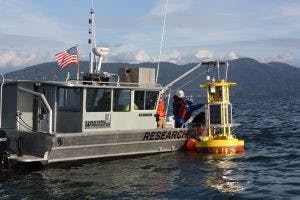Western is establishing an undergraduate degree in Marine, Coastal and Watershed Sciences. The Washington Legislature approved $1.3 million for the integrated program, according to the Washington Government Office of Program Research.
Jackie Caplan-Auerbach is the associate professor of the Western geology department and associate dean of the College of Science and Engineering. She said her and one of her colleagues proposed an oceanography major many years back.
“It wasn’t the right time or the right proposal,” Caplan-Auerbach said.
Years later, a faculty member from environmental science proposed another program that made its way to legislation and was recently approved, she said.
“We have heard for a really long time among our students that they are interested in marine science and that they would like opportunities in [this field],” Caplan-Auerbach said.
She said that because there has not been a comprehensive program in marine science, faculty work in or near the ocean was portioned into different departments.
“We were kind of scattered all over,” Caplan-Auerbach said. “We have wanted in some way to pull those interests together [into a] more cohesive approach to the studies.”
This program provides students with opportunities to gain interdisciplinary background necessary to approach a lot of these problems, she said.

Before the program, students identified a more traditional concentration in one department, such as biology or geology, Caplan-Auerbach said.
“I think we will be better suited to deal with the issues facing us in marine coastal science if we know some biology, ecology and geology,” Caplan-Auerbach said.
She said one of the treasures of Western is Shannon Point Marine Center, which engages students in hands-on research at a high-caliber marine lab. Before this program they did not have the connectivity between the main campus and Shannon Point.
Brian Bingham, interim director for the marine center, has seen a growing student interest in marine biology over the years. Bingham said the number of Western applicants that wanted to pursue marine science in 2014 was 195 and jumped to 300 by 2017.
“We’ve had calls from students who want to know how they can sign up. We are seeing inquiries through social media and university pages,” Bingham said. “I don’t think there will be a problem filling out the positions.”
He said they do not know exactly how the program will come together.
“This is truly an interdisciplinary departmental program which is going to connect biology, geology and environmental sciences at the marine center,” Bingham said. “You can imagine that it will be fairly complex, and how you develop a curriculum that bridges these various departments is new territory in many ways.”
He said the general structure will include a cohort model, foundational courses and a capstone experience.
“There’s a lot of groundwork to be done here,” Bingham said.
Caplan-Auerbach said because of the entities and colleges, they need to find a structure that will work well for all of them.
“All those details are the ones we’ve been taking up this year,” Caplan-Auerbach said.
Sophomore Darby Finnegan is studying biology with a marine emphasis. She said she will most likely have graduated by the time the program is up and running, but that the program will provide many possibilities for future students.
“I think this major is a great opportunity for people who are really interested in actually attempting to answer questions that we have about the marine world,” Finnegan said. “There’s so much we still don’t know, and that’s pretty exciting.”





